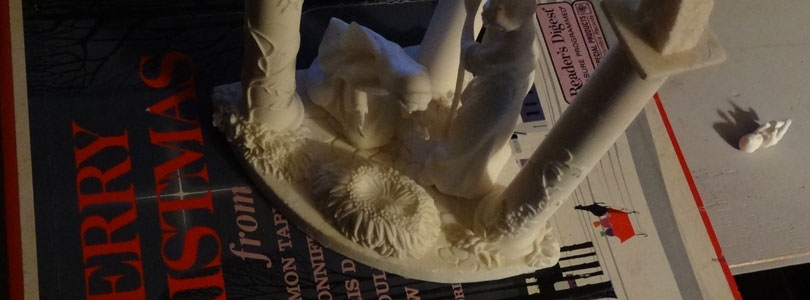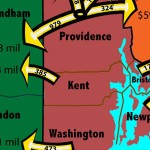The Self-Censorship of the Community and a Loss of Rights
This is quite a thing to read, in a region and a nation that prides itself on tolerance and freedoms of expression and religion. A Tiverton family has spent recent years investing in a spectacular show of Christmas lights on their house, to the extent that they’re finding the visitor traffic to be an opportunity for charitable collections.
Asked about the national news that Rhode Island’s governor, Lincoln Chafee, has made by doggedly and ineptly refusing to call the festive tree in the State House a “Christmas tree,” they responded as follows to Providence Journal reporter Richard Dujardin:
… the couple acknowledged that they, too, have been a bit cautious as to what they include in their Christmas display. There’s no Christ child, and no crèche.
If it were only up to her, said Colleen, she would have included “Christmas with a capital C,” a song that does call for keeping Christ in Christmas. But she said she was afraid some might think it too political.
“We don’t want anything political because someone might then try to shut us down. That could hurt the charities and the kids.”
“You have to remember that this is the town that once shut down the Easter Bunny,” Larry piped in, referring to a 2007 controversy when the superintendent of schools banned a parents group from setting up a booth at a school fair where people could have their pictures taken with the Easter Bunny — on grounds it would be a violation of the separation of church and state.
“Personally I think there are more important things to worry about,” said Colleen. “I worry about people who don’t have enough food to eat, and kids who are seriously ill. If people worried more about those important things, the world would be a better place.”
So, the aggressive efforts of secular zealots have accomplished a sense among the people that their public expression of religious belief — on their own property and in the context of a holiday that’s explicitly about those beliefs — would be political and that political speech would be grounds for the government to prevent charitable and community-building activities.
A lot of people across the ideological spectrum talk a good game about protecting civil rights, but the first necessity of the nation’s supporting such liberties is citizens’ knowing that they have them and knowing what they therefore have a right to do. It ought to be a source of deep concern to anybody who values the freedoms of speech and religion that our society has created such an atmosphere of fear and intimidation.
This family has the nearby example of a governor who insists that not censoring the season’s name would contradict the sense of goodwill that characterizes it. They have the closer example of a school district that tried to prevent parents from having an Easter Bunny booth at a fair.
In the region, we’ve also seen Catholic Charities of Massachusetts forbidden from providing adoption services based on a government assertion that religious groups have no right to specialize in adoptions to traditional families. And on the national stage, the U.S. Department of Health and Human Services under President Barack Obama is currently attempting to force any religious organizations that engage in activities a step beyond the church door to provide employee benefits that conflict with their religious beliefs.
Clearly, Americans are getting dangerous messages about the “separation of church and state.” The first is that the state (meaning the government generally) can impose its ideological notions on religious organizations as long as they are imposed on all organizations equally. That’s not much of a separation, inasmuch as there’s little reason the government would mind broadening its impositions.
The second dangerous message is that the state — the “public sphere” — expands well beyond the operation of government, and to the public activities of private individuals and organizations. In practical terms, the principle is that, as soon as individuals or groups act in a public way, they must take on the aesthetics and restrictions of the government, otherwise those activities are vulnerable to civic punishment.
Basically, in this separation, “church” can only act behind the closed doors of the home and the temple, while “state” expands nearly to the point of “things said out loud” in public. That notion is the complete opposite of the idea of a government for, by, and of the people.
If it’s even possible for Americans to believe that a desire to do good deeds requires hiding the religious motivation for doing them, our government is doing our neighbors and our freedoms grievous harm.



